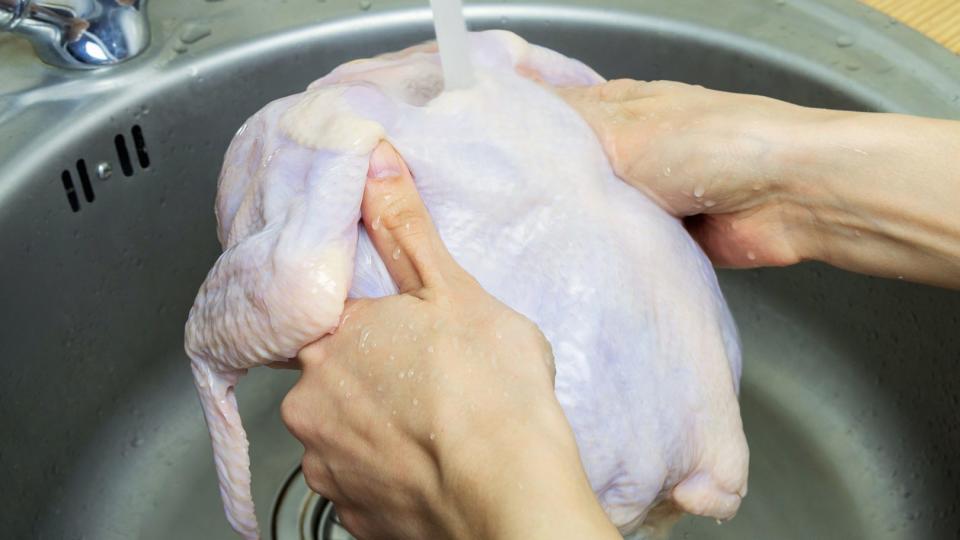Protein cleaning 101: Do you really need to run raw meat under water?

Joey Skladany is an In The Know cooking contributor. Follow him on Instagram and visit his website for more.
Former Real Housewives of Beverly Hills star Adrienne Maloof made Bravo reality TV history when she prepped a chicken by rinsing it in her kitchen sink … with soap. A horrified Lisa Vanderpump looked on in bewilderment, like the rest of America, as the shoe designer slapped on gloves and went straight for the pump, dousing the raw meat in what I can only imagine being Le Labo (rich people probably don’t use Dawn, let’s be real!).
But that got me thinking — just how many people actually do pull a Maloof on a daily basis? And if you’re not technically supposed to get your proteins sudsy, then when exactly are you required to run raw meat under water (if at all) to rid it of the bacteria that may not come off during the cooking process?
The short answer is: You actually don’t have to run any raw meat, including fish and seafood, under water before preparing it. You certainly don’t need to lather it in soap, either. In fact, rinsing a filet, breast, loin or steak may increase the chances of contracting a food-borne illness because you likely splash the salmonella or campylobacter onto nearby surfaces. This could make the surrounding area a breeding ground for germs that can easily spread with only the slightest bit of contact.
The next time you’re dealing with raw meat, keep these basic tips in mind instead:
Wash your hands before and after handling raw meat. It seems self-explanatory, but you’d be surprised how many people rub their eyes and mouths as they’re cooking, which then lands them in the hospital and/or with severe stomach problems. Take the hand-washing techniques you learned during COVID-19 quarantine and apply them to your everyday life by lathering up with hot water and really getting into the nooks and crannies of your fingers.
Toss anything that smells suspect. Your nose is a powerful tool. If anything smells rotten, sour or generally off, don’t risk it. Dispose of the meat immediately and be grateful that the loss of $5 isn’t an emergency room bill in the hundreds.
Ensure that all juices are contained. This is the source of most food-borne illnesses, so be sure that you’re not spilling raw meat liquids on the floor, countertops or in the fridge when transferring bags and trays from place to place. If you do manage to make a mess, be sure to clean it up with hot, soapy water and preferably a diluted bleach solution to really guarantee that areas are sanitized.
Use only plastic cutting boards. The aforementioned juices can soak into wooden cutting boards and become a cesspool of bacteria activity that transfers to other foods. Use only dishwasher-safe cutting boards with sturdy materials like plastic or metal to prevent this from happening. Reserve wooden ones only for produce and ingredients that lack oils (which can easily stain the wood’s surface).
Cook your meats thoroughly. Invest in a meat thermometer to ensure your internal temperatures reach safe levels. These guidelines from FoodSafety.gov are a great start and will also guarantee that most food-borne bacteria gets scorched away during cooking.
If you enjoyed this story, check out Joey Skladany’s history of the importance of corn in Mexican cooking!
The post Protein cleaning 101: Do you really need to run raw meat under water? appeared first on In The Know.

 Yahoo Finance
Yahoo Finance 